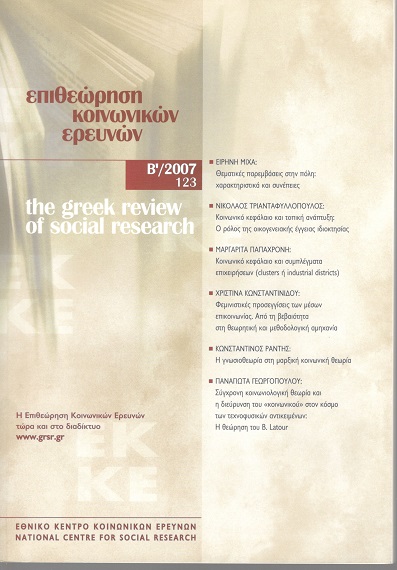Κοινωνικό κεφάλαιο και τοπική ανάπτυξη: Ο ρόλος της οικογενειακής εγγείας ιδιοκτησίας
Abstract
Η παρούσα εργασία, εστιάζοντας την προσοχή της σε δύο βασικά στοιχεία της κοινωνικής οργάνωσης και του χώρου, την οικογένεια και την έγγεια ιδιοκτησία, εξετάζει τον τρόπο παραγωγής κοινωνικού κεφαλαίου, μέσω της μελέτης των πρακτικών διαχείρισης της οικογενειακής έγγειας περιουσίας. Προσπαθώντας να εντοπίσει τους παράγοντες που ευνόησαν την κινητοποίηση του τοπικού πληθυσμού και τη συμμετοχή του στη διαδικασία της τοπικής ανάπτυξης, διερευνά τα πολιτιστικά και κοινωνικά πρότυπα που εκφράζουν οι μη αγοραίες πράξεις μεταβίβασης της ιδιοκτησίας, μέσω των οποίων υποδηλώνονται οι ατομικές και οικογενειακές στρατηγικές, εντός του γεωγραφικού πλαισίου μιας κοινότητας της Ρόδου. Παράλληλα, προχωρά σε κριτική θεώρηση των προσεγγίσεων του κοινωνικού κεφαλαίου από τους Bourdieu, Coleman και Putnam, και προωθεί τη συναρμογή τους.
Article Details
- How to Cite
-
Τριανταφυλλόπουλος Ν. (2007). Κοινωνικό κεφάλαιο και τοπική ανάπτυξη: Ο ρόλος της οικογενειακής εγγείας ιδιοκτησίας. The Greek Review of Social Research, 123, 31–54. https://doi.org/10.12681/grsr.146
- Issue
- 2007: 123, B
- Section
- Articles

This work is licensed under a Creative Commons Attribution-NonCommercial 4.0 International License.
Authors who publish with this journal agree to the following terms:
- Authors retain copyright and grant the journal right of first publication with the work simultaneously licensed under a Creative Commons Attribution Non-Commercial License that allows others to share the work with an acknowledgement of the work's authorship and initial publication in this journal.
- Authors are able to enter into separate, additional contractual arrangements for the non-exclusive distribution of the journal's published version of the work (e.g. post it to an institutional repository or publish it in a book), with an acknowledgement of its initial publication in this journal.
- Authors are permitted and encouraged to post their work online (preferably in institutional repositories or on their website) prior to and during the submission process, as it can lead to productive exchanges, as well as earlier and greater citation of published work (See The Effect of Open Access).



